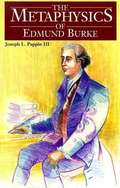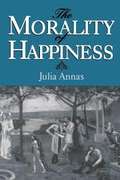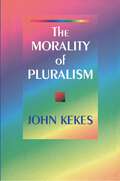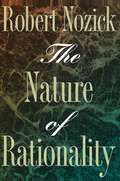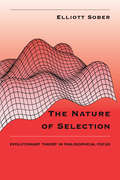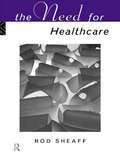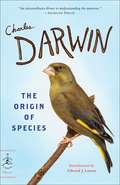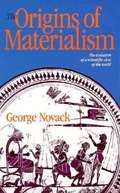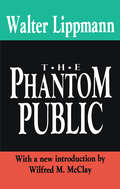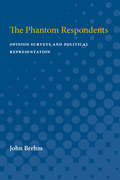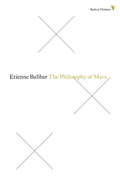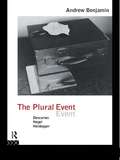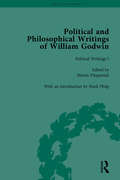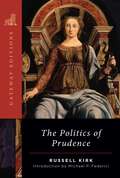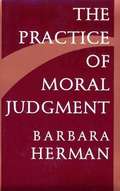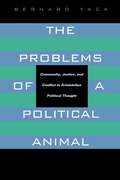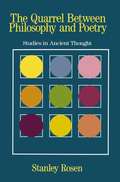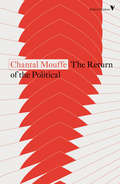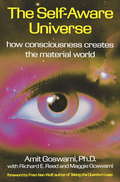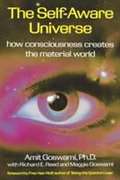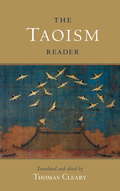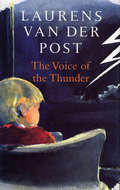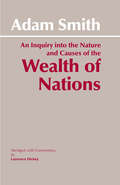- Table View
- List View
The Metaphysics of Edmund Burke
by Joseph L. PappinThe most recent commentators on Edmund Burke have renewed the charge that his political thought lacks the consistency and coherency necessary to even claim the status of a political philosophy and that he is indeed a "utilitarian." They mark him off as an "ideologist," a "rhetorician," and a "deliberate propagandist." Directly opposed to this renewed "utilitarian" interpretation of Burke is Joseph Pappin’s work The Metaphysics of Edmund Burke. Not only does this work challenge the "utilitarian" view of Burke, it sets out, as not other work on Burke has attempted to do, "to make explicit the implicit metaphysical core of Burke’s political thought." Pappin does this by examining both Burke’s critics and Burke’s own attack on a rationalist, ideologically inspired metaphysics.
The Mind and Its Depths
by Richard WollheimThis book brings together Wollheim's broad and abiding concerns to illuminate human thought at its furthest reaches of introspection and expression. Interweaving philosophy, psychoanalysis, and aesthetics, these essays reveal the critical connections between ideas and disciplines too often regarded as separate and distinct.
The Morality of Happiness
by Julia AnnasAncient ethical theories, based on the notions of virtue and happiness, have struck many as an attractive alternative to modern theories. But we cannot find out whether this is true until we understand ancient ethics--and to do this we need to examine the basic structure of ancient ethical theory, not just the details of one or two theories. In this book, Annas brings together the results of a wide-ranging study of ancient ethical philosophy and presents it in a way that is easily accessible to anyone with an interest in ancient or modern ethics. She examines the fundamental notions of happiness and virtue, the role of nature in ethical justification and the relation between concern for self and concern for others. Her careful examination of the ancient debates and arguments shows that many widespread assumptions about ancient ethics are quite mistaken. Ancient ethical theories are not egoistic, and do not depend for their acceptance on metaphysical theories of a teleological kind. Most centrally, they are recognizably theories of morality, and the ancient disputes about the place of virtue in happiness can be seen as akin to modern disputes about the demands of morality.
The Morality of Pluralism
by John KekesControversies about abortion, the environment, pornography, AIDS, and similar issues naturally lead to the question of whether there are any values that can be ultimately justified, or whether values are simply conventional. John Kekes argues that the present moral and political uncertainties are due to a deep change in our society from a dogmatic to a pluralistic view of values. Dogmatism is committed to there being only one justifiable system of values. Pluralism recognizes many such systems, and yet it avoids a chaotic relativism according to which all values are in the end arbitrary. Maintaining that good lives must be reasonable, but denying that they must conform to one true pattern, Kekes develops and justifies a pluralistic account of good lives and values, and works out its political, moral, and personal implications.
The Nature of Rationality
by Robert NozickRepeatedly and successfully, the celebrated Harvard philosopher Robert Nozick has reached out to a broad audience beyond the confines of his discipline, addressing ethical and social problems that matter to every thoughtful person. Here Nozick continues his search for the connections between philosophy and "ordinary" experience. In the lively and accessible style that his readers have come to expect, he offers a bold theory of rationality, the one characteristic deemed to fix humanity's "specialness." What are principles for? asks Nozick. We could act simply on whim, or maximize our self-interest and recommend that others do the same. As Nozick explores rationality of decision and rationality of belief, he shows how principles actually function in our day-to-day thinking and in our efforts to live peacefully and productively with each other.Throughout, the book combines daring speculations with detailed investigations to portray the nature and status of rationality and the essential role that imagination plays in this singular human aptitude.
The Nature of Selection: Evolutionary Theory in Philosophical Focus
by Elliott SoberThe Nature of Selection is a straightforward, self-contained introduction to philosophical and biological problems in evolutionary theory. It presents a powerful analysis of the evolutionary concepts of natural selection, fitness, and adaptation and clarifies controversial issues concerning altruism, group selection, and the idea that organisms are survival machines built for the good of the genes that inhabit them. "Sober's is the answering philosophical voice, the voice of a first-rate philosopher and a knowledgeable student of contemporary evolutionary theory. His book merits broad attention among both communities. It should also inspire others to continue the conversation."-Philip Kitcher, Nature "Elliott Sober has made extraordinarily important contributions to our understanding of biological problems in evolutionary biology and causality. The Nature of Selection is a major contribution to understanding epistemological problems in evolutionary theory. I predict that it will have a long lasting place in the literature."-Richard C. Lewontin
The Need For Health Care (Social Ethics and Policy)
by W.R. SheaffThe rhetoric of 'needs' has been used to legitimate all major turns in UK health policy since 1936. This study identifies the ethical, policy and technical issues arising from the concept of needs. In the first part a theory of needs is developed, which takes into account both the philosophical traditions and the practical problems arising in daily health care. In a second part, health systems throughout the world are described and compared, addressing ethical as well as economical questions. Its interdisciplinary approach will make The Need for Healthcare important reading not only for those interested in or employed in the health care sector but also for students of philosophy.
The New England Transcendentalists: Life of the Mind and of the Spirit (Perspectives On History Series)
by Ellen HansenAlong with excerpts from widely known writers, the vivid recollections of a girl and of a boy who had been students at Brook Farm School present an enlightening glimpse of the Transcendentalist philosophy. In addition to the essay by contemporary historian, Ellen Hansen, the book includes excerpts from the works of Ralph Waldo Emerson, Henry David Thoreau, Margaret Fuller, Walt Whitman, Octavius Brooks Frothingham, Kate Sloan Gaskill, and Arthur Sumner.
The Origin of the Species
by Charles DarwinTo celebrate the 150th anniversary of the publication of Charles Darwin's seminal 1859 work introducing the theory of evolution by natural selection, science writer and journalist Quammen presents the first edition text richly augmented by more than 350 images including historical photos and portraits, Darwin's own drawings, images of the places he went, the people he saw, the creatures he encountered, and the ship he traveled on. An informative introduction and extensive reproductions from The Voyage of the Beagle (Darwin's research travel narrative) as well as brief excerpts from his biography, diaries, and correspondence provide added perspective on who the man really was, how he came to develop his revolutionary theory, and how one of the most important and controversial books in history came to be. Annotation ©2009 Book News, Inc. , Portland, OR (booknews. com)
The Origins of Materialism: The Evolution of a Scientific View of the World
by George NovackAmerican communist politician and Marxist theoretician Novack (1905-1992) examines the first steps in the development of the materialist conception of the world, from its emergence among the Ionian Greeks through its elaboration in Greco-Roman society. The text is a sequel and supplement to Novack's earlier work, An Introduction to the Logic of Marxism, which outlined the main ideas of the dialectical method of thought but included minimal reference to the materialistic foundations of Marxism; this volume focuses on the materialistic roots of the Marxist outlook.
The Phantom Public
by Walter LippmannIn an era disgusted with politicians and the various instruments of "direct democracy," Walter Lippmann's The Phantom Public remains as relevant as ever. It reveals Lippmann at a time when he was most critical of the ills of American democracy. Antipopulist in sentiment, this volume defends elitism as a serious and distinctive intellectual option, one with considerable precursors in the American past. Lippmann's demythologized view of the American system of government resonates today.The Phantom Public discusses the "disenchanted man" who has become disillusioned not only with democracy, but also with reform. According to Lippmann, the average voter is incapable of governance; what is called the public is merely a "phantom." In terms of policy-making, the distinction should not be experts versus amateurs, but insiders versus outsiders. Lippmann challenges the core assumption of Progressive politics as well as any theory that pretends to leave political decision making in the hands of the people as a whole.In his biography Walter Lippmann and the American Century, Ronald Steel praised The Phantom Public as "one of Lippmann's most powerfully argued and revealing books. In it he came fully to terms with the inadequacy of traditional democratic theory." This volume is part of a continuing series on the major works of Walter Lippmann. As more and more Americans are inclined to become apathetic to the political system, this classic will be essential reading for students, teachers, and researchers of political science and history.
The Phantom Respondents
by John BrehmExamines a fundamental problem for opinion polls and those who use them.
The Philosophy Of Marx
by Etienne Balibar Chris TurnerProviding a lucid and accessible introduction to Marx, complete with pedagogical boxes, a chronology and guides to further reading, Etienne Balibar makes the most difficult areas of his philosophy easy to understand. One of the most influential French philosophers to have emerged from the 1960s, Balibar brings a lifetime of study and expertise to create a brilliantly concise portrait of Marx that will initiate the student and intrigue the scholar.He examines all the key areas of Marx's writings, including his early works, The Communist Manifesto, The German Ideology and Capital, explaining their wider historical and theoretical context. Making clear such concepts as class struggle, ideology, humanism, progress, determinism, commodity fetishism and the state, Balibar includes brief yet incisive biographical studies of key Marxists such as Althusser, Gramsci, Engels and Lenin.The Philosophy of Marx will become the standard guide to Marx's thought.
The Plural Event: Descartes, Hegel, Heidegger
by Andrew BenjaminBenjamin provides new and important readings of key canonical texts in the history of philosophy in his sustained philosophical reworking of ontology. Amongst texts included are Hegel's Difference Essay and the Shorter Logic and Heidegger's Time and Being and The Question of Being. The effective presence of ontology, defined as `an original difference', will be familiar to readers of his earlier writings. This book represents his most thorough and original contribution to contemporary philosophy to date.
The Political and Philosophical Writings of William Godwin vol 1
by Martin Fitzpatrick Mark Philp Pamela Clemit William St.ClairContains all the major political, philosophical and educational writings of William Godwin, one of the foremost philosophers of his age. His work on government and individual freedom, "Political Justice", made him the chief exponent of English radicalism in the latter half of the 18th century.
The Politics of Prudence
by Russell Kirk30th Anniversary Edition with a new introduction by Michael Federici.Conservatives are guided by prudence. So taught Russell Kirk (1918–1994), one of the founding fathers of American conservatism. If the tradition of prudential politics has fallen on hard times, its comeback might well begin in the pages of this wise book. An understanding of prudence as practical wisdom, the capacity of choosing the right means to attain worthy ends, is much needed in our time. It is the virtue most associated with the statesman. Distinguishing political prudence from ideology, Kirk examines ten principles, events, books, and thinkers that have shaped the conservative mind and heart. The final chapter examines the shortcomings of democracy throughout the world and the need for representative government conducted by temperate and thoughtful men and women. In an eloquent epilogue, Kirk calls the rising generation to the defense of order—both the moral order and the social order, the order of the soul and the order of society—against the enemies of justice, freedom, and a high culture. Reflecting decades of learning and practical experience, this lucid book is Kirk's bequest to the young men and women of today, an instruction manual for redeeming the time.
The Practice of Moral Judgment
by Barbara HermanShe urges us to abandon the tradition that describes Kantian ethics as a deontology, a moral system of rules of duty. She finds the central idea of Kantian ethics not in duty but in practical rationality as a norm of unconditioned goodness. This book both clarifies Kant's own theory and adds programmatic vitality to modern moral philosophy.
The Problems of a Political Animal: Community, Justice, and Conflict in Aristotelian Political Thought
by Bernard YackA bold new interpretation of Aristotelian thought is central to Bernard Yack's provocative new book. He shows that for Aristotle, community is a conflict-ridden fact of everyday life, as well as an ideal of social harmony and integration. From political justice and the rule of law to class struggle and moral conflict, Yack maintains that Aristotle intended to explain the conditions of everyday political life, not just, as most commentators assume, to represent the hypothetical achievements of an idealistic "best regime."By showing how Aristotelian ideas can provide new insight into our own political life, Yack makes a valuable contribution to contemporary discourse and debate. His work will excite interest among a wide range of social, moral, and political theorists.
The Quarrel Between Philosophy and Poetry: Studies in Ancient Thought
by Stanley RosenThe Quarrel Between Philosophy and Poetry focuses on the theoretical and practical suppositions of the long-standing conflict between philosophy and poetry. Stanley Rosen--one of the leading Plato scholars of our day--examines philosophical activity, questioning whether technical philosophy is a species of poetry, a political program, an interpretation of human existence according to the ideas of 19th and 20th-century thinkers, or a contemplation of beings and Being.
The Return of the Political (Phronesis Ser.)
by Chantal MouffeIn this work, Mouffe argues that liberal democracy misunderstands the problems of ethnic, religious and nationalist conflicts because of its inadequate conception of politics. He suggests that the democratic revolution may be jeopardized by a lack of understanding of citizenship, community and pluralism. Mouffe examines the work of Schmidt and Rawls and explores feminist theory, in an attempt to place the project of radical and plural democracy on a more adequate foundation than is provided by liberal theory.
The Self-Aware Universe
by Amit GoswamiConsciousness, not matter, is the ground of all existence, declares University of Oregon physicist Goswami, echoing the mystic sages of his native India. He holds that the universe is self-aware, and that consciousness creates the physical world.
The Self-Aware Universe: How Consciousness Creates the Material World
by Amit Goswami Richard E. Reed Maggie GoswamiBrings together the most recent discoveries in quantum physics and provides a powerful argument for transforming not only the way we view nature, but also how we view our own personal reality. This book challenges readers to give up their prejudices regarding material realism, to open ourselves up to the new language and new concepts that have paralleled the growth of quantum physics, and to accept the revelation that an object and the thought of an object are both products of consciousness.
The Taoism Reader
by Thomas ClearyFrom the time of its earliest sages in prehistoric China, Taoism has looked to the underlying Way of all things (the Tao) as a guide to thoughts and actions. For the Taoists, the patterns of nature revealed the answers to their deepest spiritual questions and provided the inspiration for their unique teachings. Over the centuries, Taoism has blossomed into a profound tradition with a variety of forms--all united by a single, core philosophy of radical simplicity and natural living. Today, Taoism is most widely known through the Tao-te Ching, yet its corpus of literature is vast--ranging from philosophical dialogues and essays to astonishing fables, legends, proverbs, and more. This compact collection of Taoism's greatest masterpieces introduces its most fundamental teachings and reveals the essential spirit of Tao. The Taoism Reader includes: * Tao-te Ching: the foundational source of Taoist thought by the legendary Lao Tzu * Chuang-tzu: philosophical dialogues from one of Taoism's most famous sages * Huai-nan-tzu: teachings from the time of the Han dynasty on affairs of state, natural science, and Taoist psychology * Wen-tzu: records of further sayings by Lao Tzu on the art of living * Tales of Inner Meaning: fables, stories, and jokes from the Lieh-tzu and others on the subtleties of Taoist philosophy * Sayings of Ancestor Lü: teachings from Lü Yen, a seminal figure in the founding of the Complete Reality school of Taoism and master synthesizer of China's classic spiritual traditions
The Voice of the Thunder
by Sir Laurens Van Der PostFrom the beginning, Lauren Van Der Post has been aware of a dimension in life far longer and more significant than the outer eventfulness of everyday living. His perception of life's mysterious power began with the Bushman, the first people of his native Africa, and grew in the universal imagery of dreams, the fertile legends and stories of ancient civilization, the intuitive teaching of prophets, poets and other pioneers of human awareness. In this book he has brought together two of his most deeply felt and far reaching essays, and has extended their message with great imaginative insight, exploring the potential in all men and women to acquire self-knowledge and to live life according to its fundamental precepts.
The Wealth of Nations: An Inquiry Into The Nature And Causes Of The Wealth Of Nations (Hackett Classics)
by Adam Smith Laurence DickeyThis thoughtful new abridgment is enriched by the brilliant commentary which accompanies it. In it, Laurence Dickey argues that the Wealth of Nations contains--and conceals--a great deal of how Smith actually thought a commercial society works. Guided by his conviction that the so-called Adam Smith Problem--the relationship between ethics and economics in Smith's thinking--is a core element in the argument of the work itself, Dickey's commentary focuses on the devices Smith uses to ground his economics in broadly ethical and social categories. An unparalleled guide to an often difficult and perplexing work.
